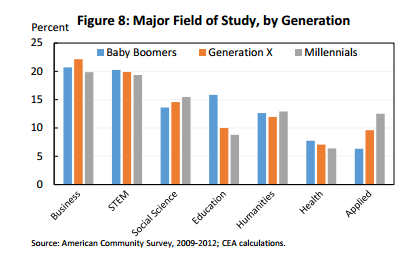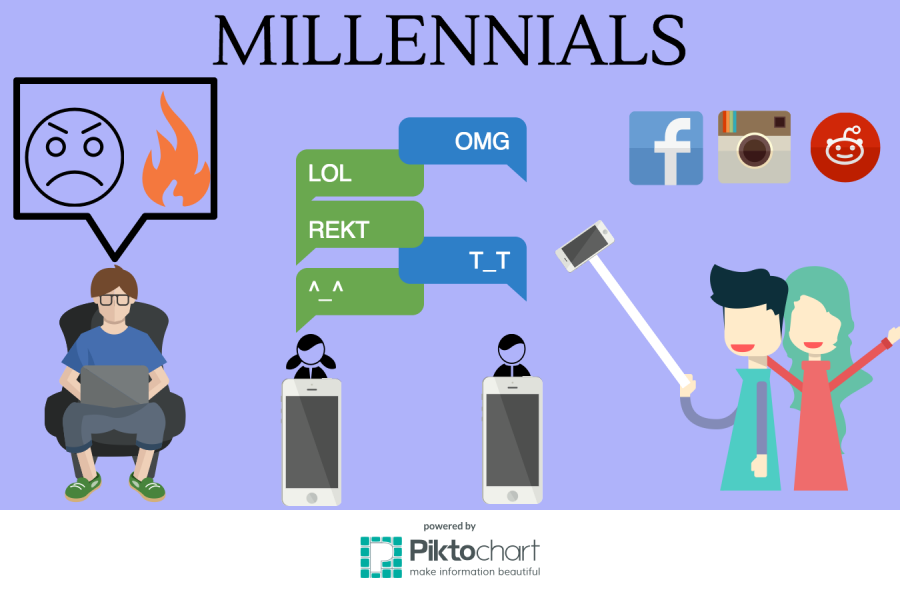Editorial: Negative meanings of “millennial” unfairly represent
The misconstrued generalizations of the millennial generation
Millennials starting to enter the workplace often find themselves cast under stereotypes such as “narcissistic,” “dependent” and “spoiled.” Yet most millennials deviate from this model entirely, as they mature and contribute to the world around them.
David Bowie’s death on Jan. 10 had a unique impact on the world. It functioned as a bridge across generations, with 80-year-old fans and their 15-year-old grandchildren paying tribute to the music legend.
But such a bridge rarely forms nowadays. As the world changes, key differences between generations have started piling up rather than dissipating. Generational stereotypes now define our interactions. For one, the term “millennial,” which groups the 1.8 billion individuals born around the world between the late 1980s to the year 2000, carries negative, unfair connotations.
On one side of the coin, millennials seem spoiled, unmotivated and dependent. Many believe that Ethan Couch, whose “affluenza” case is being hotly debated, exemplifies the stereotypical millennial. Couch, who was given a parole sentence after killing four individuals during an underage DUI accident in 2013, failed to report to his parole officer and was recently apprehended in Mexico in December. Critics deem that Couch’s perpetual disregard for the law proves that millennials as a whole lack responsibility, integrity and an understanding of consequence.
Additionally, major media sources further the negativity surrounding “millennial,” or Generation Y. TIME magazine dubbed it “The Me, Me, Me Generation.” One Washington Post opinion article took the headline, “College is not for coddling,” in response to the anti-racism protests held at colleges by millennials in November. With popular publications frequently associating pejorative words like “narcissistic” and “spoiled” with “millennial,” the connotations of the term itself seem true.
Yet, on the flipside, millennials deviate from these stereotypes. We consistently hear about individuals, who happen to be “millennials,” making positive impacts on society, technology and the arts. Malala Yousufzai (b. 1998), an advocate for women’s education and equality, became the youngest Nobel Laureate when she earned the Nobel Peace Prize in 2014 at the age of 17. Mark Zuckerberg (b. 1984) founded Facebook, a platform used by over a billion people from around the world. Millennial artists like Kendrick Lamar (b. 1987), Adele (b. 1988) and Sam Smith (b. 1992), who have all won Grammy Awards, use music to spread messages about society and their personal struggles.
Indeed, the current generation differs significantly from older ones. Between 1978 and 2012, for instance, The Council of Economic Advisers reported that the proportions of Hispanic and Asian 15-34 year-olds tripled, making Generation Y more diverse than its predecessors. Millennials, more so than Baby Boomers and Gen-Xers, seek to contribute to society and spare time for recreation, and they increasingly choose to secure college degrees. Per the same report, millennials typically strive to hold jobs that indulge creativity, rather than give definite results, earnings or advancement opportunities.

Millennials also graduate high school and college at a higher rate.
Older generations need to realize that, by default, millennials have no option but to be influential. The upcoming generation will define the directions of major industries, movements and nations around the world. Boomers had nuclear war and environmental decay, but they also had the fall of the Berlin Wall and the invention of the internet. What will our legacy be?
This piece was originally published in the pages of the Winged Post on Jan. 27, 2016
Derek Yen is a senior and the Opinion Editor of Winged Post. Derek served as the STEM Editor of Aquila and Winged Post during his junior year and as a...


















![“[Building nerf blasters] became this outlet of creativity for me that hasn't been matched by anything else. The process [of] making a build complete to your desire is such a painstakingly difficult process, but I've had to learn from [the skills needed from] soldering to proper painting. There's so many different options for everything, if you think about it, it exists. The best part is [that] if it doesn't exist, you can build it yourself," Ishaan Parate said.](https://harkeraquila.com/wp-content/uploads/2022/08/DSC_8149-900x604.jpg)




![“When I came into high school, I was ready to be a follower. But DECA was a game changer for me. It helped me overcome my fear of public speaking, and it's played such a major role in who I've become today. To be able to successfully lead a chapter of 150 students, an officer team and be one of the upperclassmen I once really admired is something I'm [really] proud of,” Anvitha Tummala ('21) said.](https://harkeraquila.com/wp-content/uploads/2021/07/Screen-Shot-2021-07-25-at-9.50.05-AM-900x594.png)







![“I think getting up in the morning and having a sense of purpose [is exciting]. I think without a certain amount of drive, life is kind of obsolete and mundane, and I think having that every single day is what makes each day unique and kind of makes life exciting,” Neymika Jain (12) said.](https://harkeraquila.com/wp-content/uploads/2017/06/Screen-Shot-2017-06-03-at-4.54.16-PM.png)








![“My slogan is ‘slow feet, don’t eat, and I’m hungry.’ You need to run fast to get where you are–you aren't going to get those championships if you aren't fast,” Angel Cervantes (12) said. “I want to do well in school on my tests and in track and win championships for my team. I live by that, [and] I can do that anywhere: in the classroom or on the field.”](https://harkeraquila.com/wp-content/uploads/2018/06/DSC5146-900x601.jpg)
![“[Volleyball has] taught me how to fall correctly, and another thing it taught is that you don’t have to be the best at something to be good at it. If you just hit the ball in a smart way, then it still scores points and you’re good at it. You could be a background player and still make a much bigger impact on the team than you would think,” Anya Gert (’20) said.](https://harkeraquila.com/wp-content/uploads/2020/06/AnnaGert_JinTuan_HoHPhotoEdited-600x900.jpeg)

![“I'm not nearly there yet, but [my confidence has] definitely been getting better since I was pretty shy and timid coming into Harker my freshman year. I know that there's a lot of people that are really confident in what they do, and I really admire them. Everyone's so driven and that has really pushed me to kind of try to find my own place in high school and be more confident,” Alyssa Huang (’20) said.](https://harkeraquila.com/wp-content/uploads/2020/06/AlyssaHuang_EmilyChen_HoHPhoto-900x749.jpeg)



